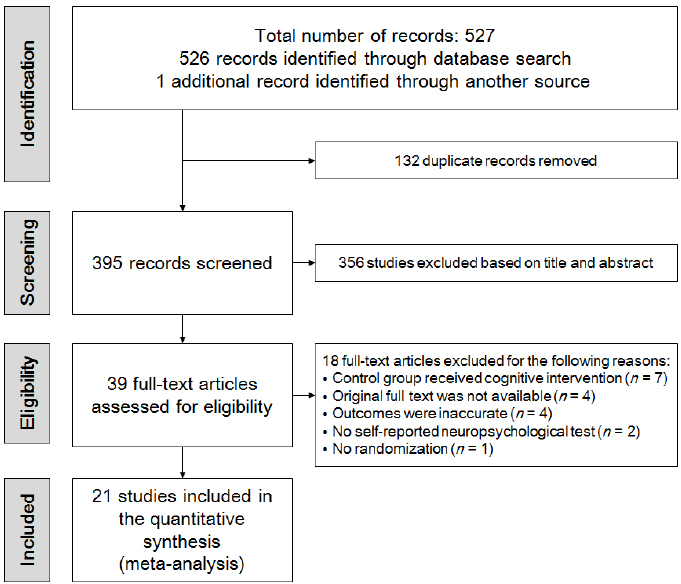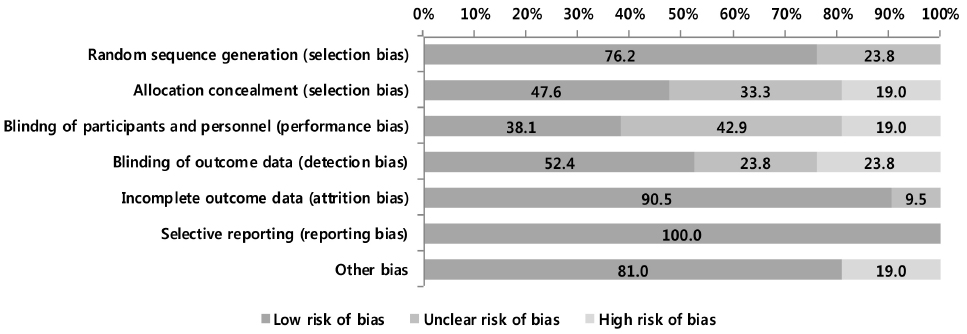Korean J Adult Nurs.
2018 Aug;30(4):347-361. 10.7475/kjan.2018.30.4.347.
Effects of Cognitive-based Interventions of Older Adults with Mild Cognitive Impairment: A Systematic Review and Meta-analysis
- Affiliations
-
- 1Invited Professor, Department of Nursing, Baekseok Culture University, Cheonan, Korea.
- 2Research Fellow, Department of Nursing, Wonju College of Medicine, Yonsei University, Wonju, Korea. mocha_choc@naver.com
- KMID: 2418978
- DOI: http://doi.org/10.7475/kjan.2018.30.4.347
Abstract
- PURPOSE
The purpose of this study was to systematically review the effects of cognitive-based interventions on the cognitive function of older adults with mild cognitive impairment and conduct a meta-analysis to present basic data based on objective evidence.
METHODS
This study analyzed the effects on older adults' cognitive function based on 21 studies using randomized controlled trials of cognitive-based interventions from 2000 to 2017.
RESULTS
The results demonstrated that the cognitive-based interventions showed statistically significant effects on language, global cognitive function, executive function, memory, visuospatial ability, and attention. All of them showed a medium effect size.
CONCLUSION
A cognitive-based intervention for older adults with mild cognitive impairment needs to be systematically and continuously applied to improve cognitive function. Such interventions can delay and prevent the progress of dementia, which will help in reducing the socioeconomic burden associated with it. In the future, it is necessary to study further, the various variables involved in continuous cognitive training programs.
Figure
Reference
-
1. World Health Organization. Dementia [Internet]. USA: World Health Organization;2016. cited 2018 January 2. Available from: http://www.who.int/mediacentre/factsheets/fs362/en.2. Ministry of Health & Welfare. 2015 National dementia strategy 3rd [Internet]. Seoul: Ministry of Health & Welfare;2016. cited 2018 July 5. Available from: http://prism.go.kr/homepage/entire/retrieveEntireDetail.do;jsessionid=6B84BDCADB7336CE5154252E59EDEBFF.node02?cond_research_name=&cond_research_start_date=&cond_research_end_date=&research_id=1351000-201500320&pageIndex=534&leftMenuLevel=160.3. Pettersson AF, Olsson E, Wahlund L-O. Motor function in subjects with mild cognitive impairment and early alzheimer's disease. Dement Geriatr Cogn Disord. 2005; 19(5-6):299–304. DOI: 10.1159/000084555.
Article4. Winblad B, Palmer K, Kivipelto M, Jelic V, Fratiglioni L, Wahlund L-O, et al. Mild cognitive impairment-beyond controversies, towards a consensus: report of the international working group on mild cognitive impairment. J Intern Med. 2004; 256(3):240–246. DOI: 10.1111/j.1365-2796.2004.01380.x.5. National Health Insurance Service. Mild cognitive impairment which is the pre-phase of dementia, the number of patients has increased by 4.3 times in recent 5 years [Internet]. Seoul: National Health Insurance Service;2015. cited 2018 January 2. Available from: https://www.nhis.or.kr/bbs7/boards/B0039/14982.6. Ellison J, Harper D, Berlow Y, Zeranski L. Beyond the “c” in mci: noncognitive symptoms in amnestic and non-amnestic mild cognitive impairment. CNS Spectr. 2008; 13(1):66–72. DOI: 10.1017/S1092852900016175.
Article7. Brenowitz WD, Kukull WA, Beresford SA, Monsell SE, Williams EC. Social relationships and risk of incident mild cognitive impairment in US alzheimer's disease centers. Alzheimer Dis Assoc Disord. 2014; 28(3):253–260.
Article8. Manly JJ, Tang MX, Schupf N, Stern Y, Vonsattel JPG, Mayeux R. Frequency and course of mild cognitive impairment in a multiethnic community. Ann Neurol. 2008; 63(4):494–506. DOI: 10.1002/ana.21326.
Article9. Clare L, Woods B. Cognitive rehabilitation and cognitive training for early-stage alzheimer's disease and vascular dementia. Cochrane Database Syst Rev. 2003; 4:CD003260. DOI: 10.1002/14651858.CD003260.
Article10. Hong YJ, Jang EH, Hwang J, Roh JH, Lee JH. The efficacy of cognitive intervention programs for mild cognitive impairment: a systematic review. Curr Alzheimer Res. 2015; 12(6):527–542. DOI: 10.2174/1567205012666150530201636.
Article11. Simon SS, Yokomizo JE, Bottino C. Cognitive intervention in amnestic mild cognitive impairment: a systematic review. Neurosci Biobehav Rev. 2012; 36(4):1163–1178. DOI: 10.1016/j.neubiorev.2012.01.007.
Article12. Hill NT, Mowszowski L, Naismith SL, Chadwick VL, Valenzuela M, Lampit A. Computerized cognitive training in older adults with mild cognitive impairment or dementia: a systematic review and meta-analysis. Am J Psychiatry. 2016; 174(4):329–340. DOI: 10.1176/appi.ajp.2016.16030360.
Article13. Jeong PY, Sung JE, Sim HS. Meta-analysis of cognition-focused intervention for people with mild cognitive impairment and dementia. Commun Sci Disord. 2014; 19(2):199–212. DOI: 10.12963/csd.14122.
Article14. Li H, Li J, Li N, Li B, Wang P, Zhou T. Cognitive intervention for persons with mild cognitive impairment: a meta-analysis. Ageing Res Rev. 2011; 10(2):285–296. DOI: 10.1016/j.arr.2010.11.003.
Article15. Lezak MD, Howieson DB, Bigler ED, Tranel D. Neuropsychological assessment. 5th ed. UK: Oxford University Press;2012.16. Littell JH, Corcoran J, Pillai V. Systematic reviews and metaanalysis. New York: Oxford University Press;2008.17. Schulz KF, Grimes DA. Allocation concealment in randomised trials: defending against deciphering. Lancet. 2002; 359(9306):614–618. DOI: 10.1016/S0140-6736(02)07750-4.
Article18. Higgins JPT, Green S. Cochrane handbook for systematic reviews of interventions version 5.1.0 [Internet]. UK: The Cochrane Collaboration;2011. cited 2018 March 5. Available from: http://handbook-5-1.cochrane.org.19. Richard L, Strub F, William B. Rehabilitation team of Pusan National University. The mental status examination in neurology. 4th ed. Philadelphia, PA: F.A. Davis Company;2000.20. Cohen J. Statistical power analysis for the behavioral sciences. 2nd ed. USA: Lawrence Erlbaum Associates;1988. p. 400.21. Egger M, Smith GD, Schneider M, Minder C. Bias in meta-analysis detected by a simple, graphical test. BMJ. 1997; 315(7109):629–634. DOI: 10.1136/bmj.315.7109.629.
Article22. Bahar FA, Clare L, Woods B. Cognitive training and cognitive rehabilitation for mild to moderate alzheimer's disease and vascular dementia. Cochrane Database Syst Rev. 2013; 6:CD003260. DOI: 10.1002/14651858.CD003260.pub2.23. Braver TS, Satpute AB, Rush BK, Racine CA, Barch DM. Context processing and context maintenance in healthy aging and early stage dementia of the alzheimer's type. Psychol Aging. 2005; 20(1):33–46. 10.1037/0882-7974.20.1.33.
Article24. Lampit A, Hallock H, Valenzuela M. Computerized cognitive training in cognitively healthy older adults: a systematic review and meta-analysis of effect modifiers. PLoS Med. 2014; 11(11):e1001756. DOI: 10.1371/journal.pmed.1001756.
Article26. Ritchie K, Artero S, Touchon J. Classification criteria for mild cognitive impairment a population-based validation study. Neurology. 2001; 56(1):37–42. DOI: 10.1212/WNL.56.1.37.27. Hoefler CE. Computer-based cognitive training and alzheimer's disease: a meta-analysis [dissertation]. Winona, Minnesota: Saint Mary's University of Minnesota;2016. 1–50.28. Fernandez BR, Zamarron MD, Tarraga L. Learning potential: a new method for assessing cognitive impairment. Int Psychogeriatr. 2005; 17(1):119–128. DOI: 10.1017/S1041610205000992.
- Full Text Links
- Actions
-
Cited
- CITED
-
- Close
- Share
- Similar articles
-
- Effects of medication adherence interventions for older adults with chronic illnesses: a systematic review and meta-analysis
- The Clinical Significance of Cognitive Interventions for the Patients with Mild Cognitive Impairment
- Correlates of Cognitive Impairment of Rheumatic Disease: Systematic Review and Meta-analysis
- Effects of a Computerized Cognitive Training on Cognitive Function, Depression, Self-esteem, and Activities of Daily Living among Older Adults with Mild Cognitive Impairment
- Risk Factors for Depressive Symptoms among Older Adults with Mild Cognitive Impairment: An Analysis of Data from the Eighth Korean Longitudinal Study of Aging 2020




